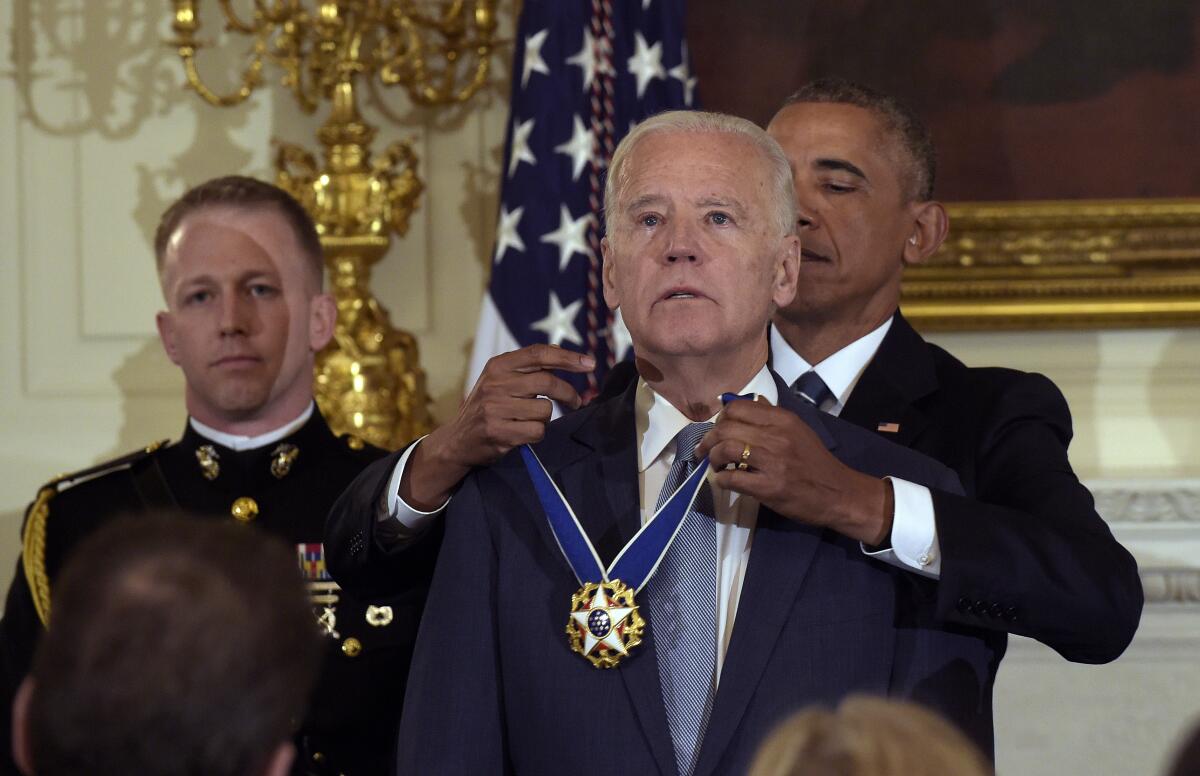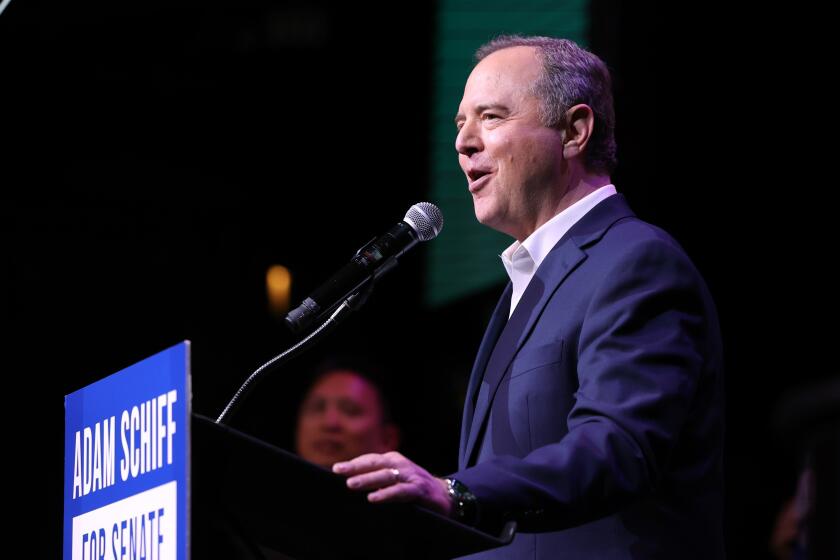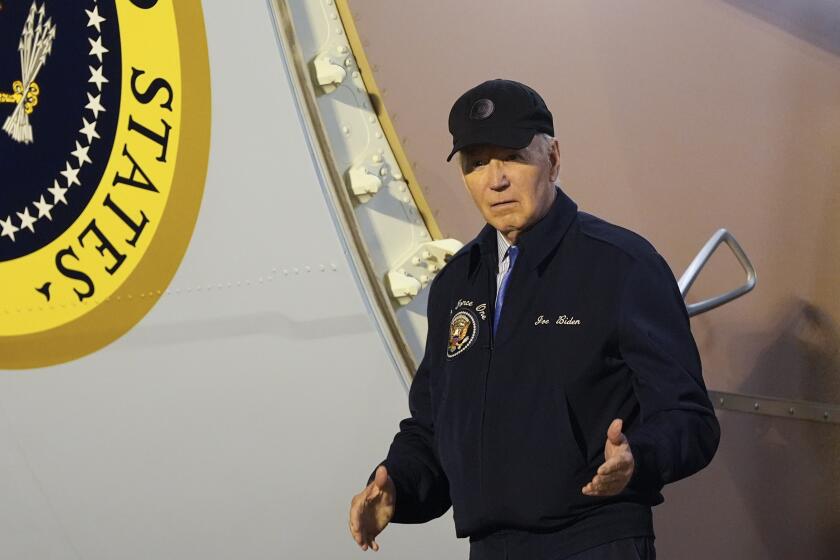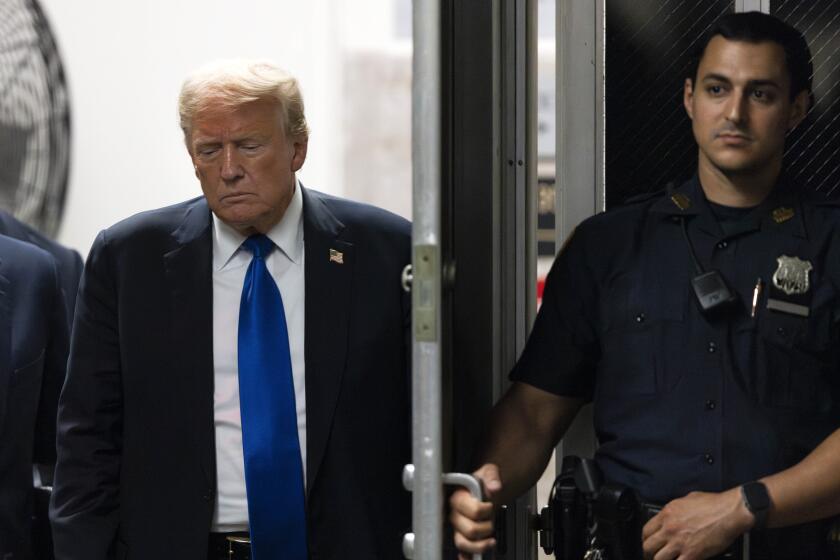Obama’s dilemma: Balancing Democrats’ worries and maintaining influence with Biden

WASHINGTON — Former President Obama has a delicate balance to strike: how to weigh the mounting opposition to President Biden continuing his reelection campaign with his loyalty to his former vice president.
In recent calls from Democratic congressional leaders, governors and key donors, Obama has indicated he shares their unease about the campaign’s prospects following Biden’scalamitous June 27 debate performance against his Republican rival, Donald Trump, according to several people familiar with the matter who requested anonymity to discuss the private conversations.
But, they said, even as Obama has listened to Democrats’ concerns, he has insisted that the decision to remain in the race is Biden’s to make.
Obama finds himself navigating through one of the most delicate political challenges for Democrats since President Clinton’s impeachment, with much higher stakes. It’s a moment that requires Obama to engage as a party elder and an honest broker for Democrats seeking advice — while avoiding being seen as betraying Biden.
“President Obama has to and wants to play the role of statesman, above the political fray, that former presidents have traditionally played,” said Matt Bennett, who served as a vice presidential aide to Al Gore and is now an executive vice president at the Democratic-leaning group Third Way. “He also wants to remain a credible sounding board for President Biden. If he takes a public position, that ends it.”
Obama’s relationship with Biden started as a marriage of political convenience when he picked the veteran Delaware senator in 2008 to be his running mate. When they served in the Senate together, the two were not close.
Rep. Adam Schiff called Wednesday for President Biden to end his reelection bid, citing “serious concerns” about his ability to win.
It was a selection made in part to quiet concerns about Obama’s relative inexperience — he’d not yet served four years in the Senate — and to make white Democrats more comfortable with casting their ballots for the prospective first Black president. The pragmatic relationship eventually evolved into a true partnership and friendship.
Julián Castro, who served as Housing and Urban Development secretary under Obama, said that he hasn’t been privy to the private talks Obama has had about Biden in recent days, but that it is crucial for “respected, trusted elders within the party” to speak clearly to the president about the headwinds Democrats will face if he stays in the race.
“Whether it’s President Obama, former President Clinton, Secretary Clinton, I think their most important role, at this point, is helping to ensure that we have a successful November,” said Castro, who sought the Democratic presidential nomination against Biden in 2020 and has recently called on him to end his current candidacy.
Obama’s concerns have surfaced as former House Speaker Nancy Pelosi of San Francisco presented polling to Biden that she argued shows he probably can’t defeat Trump again. Other influential Democrats, including Senate Majority Leader Charles E. Schumer and House Minority Leader Hakeem Jeffries, both of New York, have also sent signals of concern about Biden’s political viability.
Some report the president is closer to caving to pressure to leave the race as he isolates to recover and his rival basks in the spotlight at the Republican National Convention.
Meanwhile, among Democratic voters surveyed nationwide, nearly two-thirds say Biden should step aside and let the party nominate someone else, according to a recent AP-NORC Center for Public Affairs Research poll.
That sharply undercuts Biden’s post-debate claim that “average Democrats” are still with him even if some “big names” are turning on him.
The president is relying largely on longtime aides as he weighs whether to bow to pressure to step aside. He has remained publicly insistent that he’s the Democrat best-positioned to beat Trump.
Campaign officials say Biden has been even more committed to staying in the race as the calls for him to quit have grown. But there is also time for him to reconsider — a brief opening for party leaders trying to plot his exit.
Obama has been taking more calls than he’s been making on the matter, and sees protecting Biden and his legacy as his top concern, according to those familiar with his thinking. Publicly, he has largely remained silent about Biden’s political tailspin.
Trump’s running mate, J.D. Vance, once said: ‘I don’t really care what happens to Ukraine one way or the other.’
In the calls with allies, Obama has been protective of the president, and has indicated he doesn’t think it would be productive to take a stronger stance himself — publicly or even privately — according to people familiar with the matter.
Obama is also mindful of lingering tension over the 2016 presidential race, which some in the former president’s senior staff had urged Biden not to enter.
In his memoir “Promise Me, Dad,” Biden wrote about a 2015 lunch with Obama, just months after son Beau Biden had died of cancer.
Jurors deliberated for 9½ hours over two days before convicting former President Trump of all 34 counts he faced in a hush-money scheme surrounding the 2016 election.
Obama, Biden recalled, asked whether he would run to succeed him. Biden said he told Obama that he was not ready to make up his mind, but that if he decided to run he would do it in time to be viable. “The president was not encouraging,” he wrote.
As Biden was pondering whether to run, Obama also urged him to sit down with David Plouffe, an architect of Obama’s winning 2008 campaign.
When he did, Plouffe made it clear to Biden that he would face an uphill climb against Vermont’s Sen. Bernie Sanders and former Secretary of State Hillary Clinton, who would go on to win the Democratic nomination.
Since last month’s debate, more than 20 Democratic lawmakers have called on Biden to exit. He’s also facing stinging criticism from prominent alumni of the Obama White House, including a group of senior aides that host the popular podcast “Pod Save America” and former senior advisor and CNN analyst David Axelrod.
“There have always been two Joe Bidens. The empathetic, decent, big-hearted leader, forged in loss and grief, finding the good in his friends and opponents, in love with America, arms wide and open with space for everyone,” Jon Lovett, a former Obama speechwriter and “Pod Save America” cohost, wrote recently on the social media site X. “And there’s the blowhard with a chip on his shoulder, stubborn, something to prove, his fellow senators rolling their eyes as the finger wags harder and the stories get longer. Statesman and politician, hero and fool.”
In an interview with BET last week, Biden maintained that he still had plenty of time to right his campaign.
Obama’s concerns are surfacing as many Democrats believe time is running out to get Biden to leave the race, with the Democratic National Convention just weeks away.
But Biden and Obama, as they try to find their way through this moment, seem flummoxed by the weight of legacy and tradition, said Edward Frantz, a presidential historian at the University of Indianapolis.
In nearly eight years out of office, he said, Obama has largely maintained the post-presidency tradition of predecessors who have sought to avoid wading deeply into politics.
Biden, meanwhile, seems deeply aware that history often hasn’t judged one-term presidencies kindly, Frantz said.
“Both Biden and Obama have legacy on their minds, and they have to juggle that along with duty to party and country,” he said. “To step away knowingly and willingly? Few have done so.”
Madhani, Weissert and Miller write for the Associated Press. AP writers Lisa Mascaro and Mike Balsamo contributed to this report.














